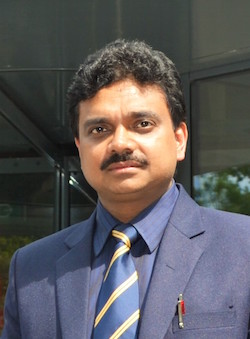 Ranjit Kumar
Ranjit Kumar
Additional Director
Directorate General of Central Excise Intelligence
Ministry of Finance, India
Public Finance Program (’12)
Please tell us about your career path so far. What is your area of specialization and how did you come to work in this area?
I joined the Indian Revenue Service (Customs & Central Excise) as a career bureaucrat after receiving my degree of Bachelor of Technology in Electrical Engineering from the Indian Institute of Technology, Kanpur, India. Prior to joining the Indian bureaucracy as a Tax Administrator, I worked in the Center for Policy Research in the year 1994 on a project, namely “Vision 2020” which suggested policy initiatives to make India a developed nation by 2020. The assignment at the Center for Policy Research introduced me to the realm of policy making for better future of people.
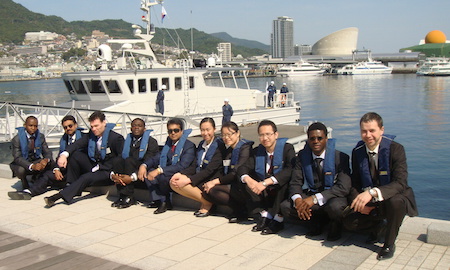
Ready to patrol – Protecting the frontiers of our host @Nagasaki
The journey of my public life as Tax Administrator started as a head of a unit at Kolkata- a metropolitan city in the eastern India, which had over hundred tax officers of various designation and thousands of tax-paying industries and business enterprises. My job was to implement the law and policy of the Government to collect Central Excise Duties and Service Tax in the territorial jurisdiction assigned. Those were the days when India had initiated large-scale economic reforms, which included tax reforms. I got the opportunity to get associated with the change from assessment-based tax compliance to self-assessment and audit-based compliance system. The association helped me learn how a new system is designed and implemented through change management. Later, during my stint in the Ministry of Finance, this learning was of a great aid in devising a legal framework for IPR Border Measures and contributing in the formulation of a Special Economic Zone policy and the law.
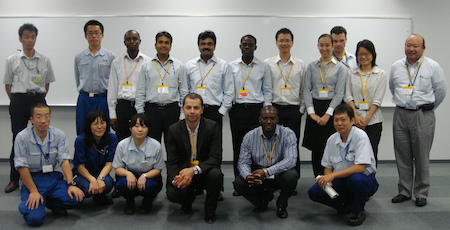
Training session with Japan Customs
As knowledge of law and jurisprudence is essential to devise a policy and its implementation mechanism, I studied Law and was conferred a degree of Bachelor of Laws (LL.B). The study of law gave me great exposure to the evolution of social and political consciousness over the period of time and how law and its compliance determine the direction in which a society moves. I was also able to
understand and appreciate the finer nuances of tax policy and its impact on people, especially those who are vulnerable and whose survival depends on state support. While I was making use of my experience in formulation of policy and drafting law of Customs in the Customs Administration at Delhi, news of the financial crisis broke. The epicentre of the crisis was the USA but it was inevitable that the entire world was going to feel tremors. The growth story of developing countries like India was feared to take turn. Certain sections of Indian industries and businesses suggested controlled decoupling of the Indian economy from the world economy to prevent tremors of financial meltdown damaging the Indian economy. While such demands were getting louder, developed economies and eminent economists of the globe were of the view that it’s developing economies like China and India which can afford to grow in these difficult circumstances and pull out the world economy from the depression.
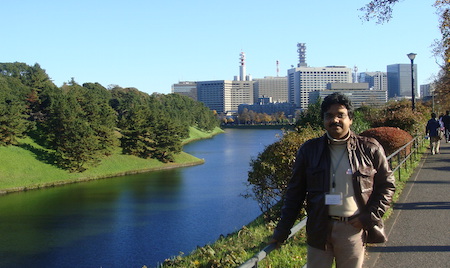
A beautiful and sunny winter day near the Imperial Palace
To take a balanced view, the Government of India decided to use the trade protection tools provided by WTO. I was ordered to join the Directorate General of Safeguards to conduct safeguard investigations to protect domestic industries from the onslaught of rising imports within the framework of Agreement on Safeguards and WTO provisions. We took up the challenge and conducted a number of Safeguards Investigations and became the WTO member who conducted the largest number of investigations and imposed Safeguard Duties to protect domestic industries. Our judicious approach and justified action obviated any dispute to reach WTO as trade dispute. While protecting domestic industries we ensured that these bitter pills of trade protection remain optimal and temporary.
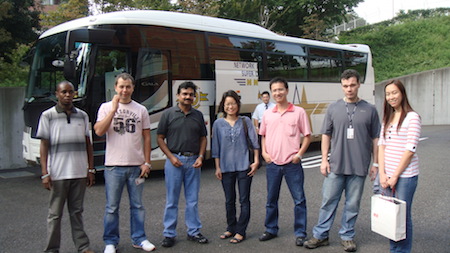
Ready to go on a study tour
In a few years, the world economy started coming out from the doom of depression because of the concerted and coordinated efforts of leaders and people across the globe. The visible results of collective action encouraged leaders to move towards conclusion of the Doha Round of trade negotiation, which was being perceived as casualty to inflexible negotiators. A possibility of reaching a common point for common good seemed visible. The Indian Customs, being a very important member of Group to formalise Indian views on Trade Facilitation, restructured the team to fast track the negotiations and I was asked to make a Cell to effectively put forth the views of developing nations at WTO immediately and increase contributions of Indian Customs at WCO. Our team formulated the views and strategy for negotiations and negotiated at Geneva.
The increased international exposure fuelled my deep desire to study Finance and International Relations. I came across the opportunity being offered by GRIPS and WCO. I placed my request before them and they accepted to give me the opportunity to study at GRIPS. I lived the joyous one year of student life in the campus of GRIPS at Roppongi while staying at a Tokyo Bay-facing spacious apartment of TIEC at Odaiba. The student life at Tokyo was a welcome refreshing break from the decade-old life as a bureaucrat. After enriching myself from the teaching and experiences of internationally acclaimed, renowned and learned professors as well as best of the best fellow students from all over the globe, I returned to my homeland.
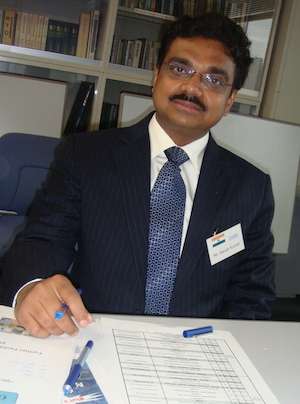
Representing India at a seminar
I was assigned the task of managing the establishment and administration of over three thousand tax officers of various ranks. While I was contributing to the administration by bringing small improvements, the State Governments and Central Government reached a broader consensus to bring mega reforms in the indirect tax structure by introducing a Goods and Service Tax (GST) and a team to design structure and draft GST law was constituted.
I was also nominated as a member of the team along with a few other very senior officials of proven capability. The design started with great vigour in 2013, which included negotiations and arriving at consensus as the decision on the structure needed to be taken unanimously. The design of GST was completed and a draft GST law was made public for comments in mid 2016.
Like most of the members of the team, I need to work for the new tax structure while administering the existing one. I was assigned the position of Additional Director at Directorate General of Central Excise Intelligence, New Delhi in 2015 and I was conferred a Presidential Award – the highest award for Revenue Officials – on Republic Day of 2016 for my “Specially Distinguished Record of Service.
You are currently working as Additional Director of the Directorate General of Central Excise Intelligence (DGCEI) under the Ministry of Finance. What are your main responsibilities and duties?
The Directorate General of Central Excise is the apex organisation to check evasion of Central Indirect Taxes. The organisation is responsible for collecting and collating intelligence of evasion of taxes. It is also empowered to act on the basis of intelligence and investigate evasion cases. As Additional Director of DGCEI my main responsibility is to monitor collection of intelligence and investigation of evasion cases. We also conduct studies to uncover loop-holes in law and procedure, and recommend the government to plug the loop-holes to improve compliance. With India moving towards a new tax regime, my job includes process design for the investigation under the new law.
In your current capacity, what do you see as the main opportunities and challenges for India over the course of the next five to ten years?
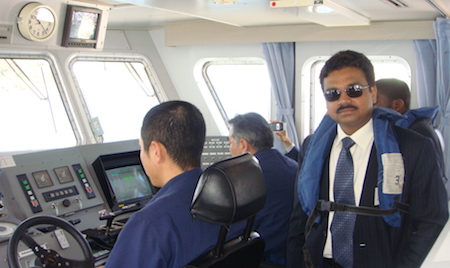
Inside a specially designed high-speed patrol boat
The Indian Tax collection system, at present, is at crossroads and the Indian Parliament has unanimously voted in favour of the new Tax system- Unified Goods and Service Tax to make the entire India a common market by removing the trade barriers at state borders. The GST, being a better tax structure brings new opportunities to deliver better and more efficient tax administration, which is likely to improve the Tax-GDP ratio. However, the introduction of the new tax system brings both opportunities and challenges. The international experience of GST implementation is a mixed one. Thus, the next few years are going to be critical. The implementation is likely to face challenges of managing change without changing human resources, managing the IT system which should be capable to deal with billions of transactions, managing the man-machine interaction and working with a legal framework in over 20 languages. These mammoth challenges require concerted and planned efforts in a scientific manner. The institutions in India, including the present tax collection department are robust and resilient to deal with such challenges. I am confident that we would be able to deal with all challenges and make GST bring new opportunities to take India to a league of developed nations.
What are some of the biggest challenges you face in your work? And what have been the most interesting or rewarding aspects of your career thus far?
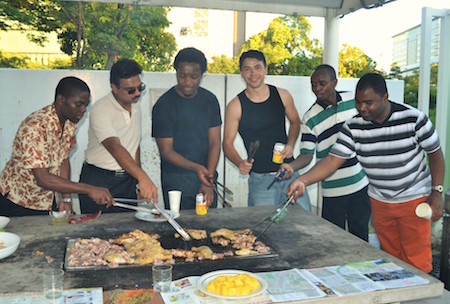
Barbeque delight at TIEC, Odaiba, Tokyo
A good tax administration works on the basis of mutual trust. Being engaged in policy design for long, my decision making process is also based on trust. However, the intelligence agencies and taxpayers, historically, have had a relationship of mistrust. My present assignment in the intelligence agency brings a big challenge of managing the balance between facilitation and enforcement; trust and mistrust.
I find myself lucky as I got a number of interesting, important and rewarding opportunities to work in varied fields. However, the most interesting assignment was to work on the draft text of the Negotiating Group on Trade Facilitation for the Doha Round of Negotiation at WTO. While working on the draft, I came across different and diverse views on various issues. I also observed how even a small procedure of trade has different perspectives and adds different dimensions in international trade. I learnt how negotiators put forth the national interests and how diverse interests converge to become the common interest of all.
What led you to GRIPS? What was the most important thing you learned while here, and how has your experience at GRIPS prepared you for future endeavours?
My earlier exposure in policy making and immediate experience in international trade negotiation to bring a uniform and more efficient trade facilitation regime the world over stimulated me to learn the art and science of policy making in a systematic manner. GRIPS in Japan was a right choice as the Institute is dedicated to policy studies and Japan is the best example that proves how a country can overcome the natural calamities, ravages of war, deficiency in natural resources and remain an economic power. Now, I can proudly boast that the choice was the right choice and I am better prepared to deliver more efficient policies and administrative prescriptions.
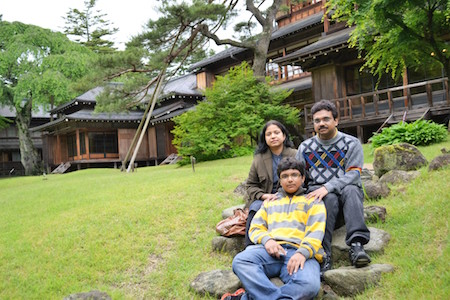
My sweet family at Nikko Imperial Villa
How do you maintain a balance between your work and the rest of your life? And what is your favorite thing to do when you are not working?
I believe that it is very difficult to compartmentalize work life and personal life while being in the public service. However, creating harmony between official life and personal life holds key to consistent performance. I make efforts to take out time for my family, my friends, my hobbies and my health. Reading books remains my favorite thing to do in spare time.
What are some of your fondest memories of your time spent at GRIPS? And what do you miss about Japan?
The one year that I spent in Japan is amongst the best of times of my life. I have many fond memories, which often flash to remind my good days there. I cherish the moments spent at TIEC, especially late night parties, walking along the seaside with friends and watching the Rainbow Bridge at night.
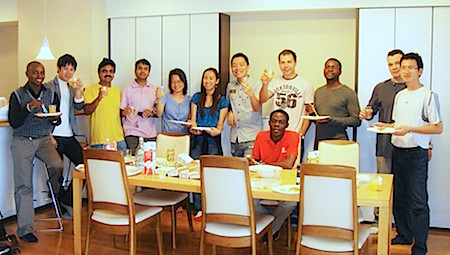
Weekend party at my apartment at TIEC – a wonderful spacious home facing Tokyo Bay
The train ride sitting on the pilot seat while travelling from Fune-no-kagakukan to Shiodome was such a pleasure trip that I wish to come back to Tokyo and take a ride again.
I developed a taste for Japanese food and love miso soup, makizushi, ramen, tempura. I miss the sashimi, which we had at the dinner hosted by Professor Hatta, the most.
If you could give one piece of advice to anyone considering studying at GRIPS what would it be?
If you get the opportunity to study at GRIPS, you must grab it. One year of study at GRIPS will give you years of lead over your colleagues who could
not get this opportunity. Your efficiency, your work style and your ability
to contribute to society would visibly improve by the teachings at GRIPS.
How would you like to maintain involved with the School? What do you expect from GRIPS as an alumnus and o you have any suggestions on how to further utilize the GRIPS alumni network?
GRIPS is amongst the best policy schools in the world and the top school of Asia. Being an Asian school, I expect that GRIPS should take the lead and responsibility to contribute towards policy initiatives to eradicate poverty and promote peace in the continent. The Alumni of GRIPS should come together and contribute towards making Asia a better and prosperous place to live.





